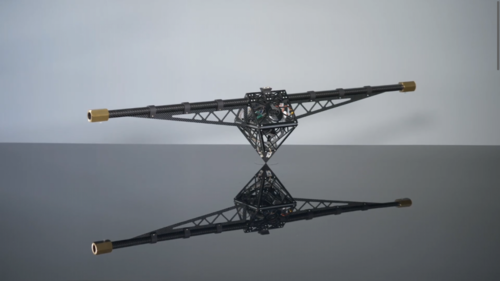2024
Guist, S., Schneider, J., Ma, H., Chen, L., Berenz, V., Martus, J., Ott, H., Grüninger, F., Muehlebach, M., Fiene, J., Schölkopf, B., Büchler, D.
Safe & Accurate at Speed with Tendons: A Robot Arm for Exploring Dynamic Motion
Proceedings of Robotics: Science and Systems, July 2024 (conference)
Kladny, K., Kügelgen, J. V., Schölkopf, B., Muehlebach, M.
Deep Backtracking Counterfactuals for Causally Compliant Explanations
Transactions on Machine Learning Research, July 2024 (article)
Zughaibi, J., Nelson, B. J., Muehlebach, M.
Balancing a 3D Inverted Pendulum using Remote Magnetic Manipulation
Robotics and Automation Letters, 2024 (article) In revision
Wundram, A., Fischer, P., Muehlebach, M., Koch, L., Baumgartner, C.
Conformal Performance Range Prediction for Segmentation Output Quality Control
International Conference on Medical Image Computing and Computer-Assisted Intervention (MICCAI), 2024 (conference) Submitted
Fischer, P., Willms, H., Muehlebach, M., Thorwarth, D., Schneider, M., Baumgartner, C.
Subgroup-Specific Risk-Controlled Dose Estimation in Radiotherapy
International Conference on Medical Image Computing and Computer-Assisted Intervention (MICCAI), 2024 (conference)
Florian Dörfler, Zhiyu He, Giuseppe Belgioioso, Saverio Bolognani, John Lygeros, Michael Muehlebach
Towards a systems theory of algorithms
IEEE Control System Letters, 2024 (article)
Kolev, P., Martius, G., Muehlebach, M.
Online learning under adversarial nonlinear constraints
In Advances in Neural Information Processing Systems 36, 2024 (inproceedings)
Eberhard, O., Vernade, C., Muehlebach, M.
A Pontryagin Perspective on Reinforcement Learning
Max Planck Institute for Intelligent Systems, 2024 (techreport)
Ma, H., Zeilinger, M., Muehlebach, M.
Stochastic Online Optimization for Cyber-Physical and Robotic Systems
Machine Learning, 2024 (article) Submitted
Er, D., Trimpe, S., Muehlebach, M.
Distributed Event-Based Learning via ADMM
Max Planck Institute for Intelligent Systems, 2024 (techreport)
He, Z., Bolognani, S., Muehlebach, M., Dörfler, F.
Gray-box nonlinear feedback optimization
IEEE Transactions on Automatic Control, 2024 (article) Submitted
Muehlebach, M., Jordan, M. I.
Accelerated First-Order Optimization under Nonlinear Constraints
Mathematical Programming, 2024 (article) Submitted
Zhang, L., He, N., Muehlebach, M.
Primal Methods for Variational Inequality Problems with Functional Constraints
Mathematical Programming, 2024 (article) Submitted
2023
Guist, S., Schneider, J., Ma, H., Berenz, V., Martus, J., Grüninger, F., Muehlebach, M., Fiene, J., Schölkopf, B., Büchler, B.
A Robust Open-source Tendon-driven Robot Arm for Learning Control of Dynamic Motions
RoboLetics: Workshop on Robot Learning in Athletics @CoRL 2023, November 2023 (conference)
Kladny, K., von Kügelgen, J., Schölkopf, B., Muehlebach, M.
Causal Effect Estimation from Observational and Interventional Data Through Matrix Weighted Linear Estimators
Proceedings of the Thirty-Ninth Conference on Uncertainty in Artificial Intelligence (UAI), 216, pages: 1087-1097, Proceedings of Machine Learning Research, (Editors: Evans, Robin J. and Shpitser, Ilya), PMLR, August 2023 (conference)
Achterhold, J., Tobuschat, P., Ma, H., Büchler, D., Muehlebach, M., Stueckler, J.
Black-Box vs. Gray-Box: A Case Study on Learning Table Tennis Ball Trajectory Prediction with Spin and Impacts
In Proceedings of the 5th Annual Learning for Dynamics and Control Conference (L4DC), 211, pages: 878-890, Proceedings of Machine Learning Research, (Editors: Nikolai Matni, Manfred Morari and George J. Pappa), PMLR, June 2023 (inproceedings)
Kladny, K.
CausalEffect Estimation by Combining Observational and Interventional Data
ETH Zurich, Switzerland, February 2023 (mastersthesis)
Ma, H., Büchler, D., Schölkopf, B., Muehlebach, M.
Reinforcement learning with model-based feedforward inputs for robotic table tennis
Autonomous Robots, 47, 2023 (article)
Tong, G., Muehlebach, M.
A Dynamical Systems Perspective on Discrete Optimization
Conference on Learning for Dynamics and Control, 2023 (conference)
Hofer, M., Muehlebach, M., D’Andrea, R.
The One-Wheel Cubli: A 3D inverted pendulum that can balance with a single reaction wheel
Mechatronics, 91, 2023 (article)
Tobuschat, P., Ma, H., Büchler, D., Schölkopf, B., Muehlebach, M.
Data-Efficient Online Learning of Ball Placement in Robot Table Tennis
EEE/RSJ International Conference on Intelligent Robots and Systems, 2023 (conference)
Muehlebach, M.
Adaptive Decision-Making with Constraints and Dependent Losses: Performance Guarantees and Applications to Online and Nonlinear Identification
IFAC World Congress, 2023 (conference)
Schechtman, S., Tiapkin, D., Muehlebach, M., Moulines, E.
Orthogonal Directions Constrained Gradient Method: from Non-Linear Equality Constraints to Stiefel Manifold
Conference on Learning Theory, 2023 (conference)
2022
Das, A., Schölkopf, B., Muehlebach, M.
Sampling without Replacement Leads to Faster Rates in Finite-Sum Minimax Optimization
Advances in Neural Information Processing Systems 35 (NeurIPS 2022), pages: 6749-6762, (Editors: S. Koyejo and S. Mohamed and A. Agarwal and D. Belgrave and K. Cho and A. Oh), Curran Associates, Inc., 36th Conference on Neural Information Processing Systems (NeurIPS 2022) , December 2022 (conference)
Ma, H., Büchler, D., Schölkopf, B., Muehlebach, M.
A Learning-based Iterative Control Framework for Controlling a Robot Arm with Pneumatic Artificial Muscles
Proceedings of Robotics: Science and Systems XVIII (R:SS 2022), 18, (Editors: Kris Hauser, Dylan Shell, and Shoudong Huang), Robotics: Science and Systems XVIII, June 2022 (conference)
Muehlebach, M., Jordan, M. I.
On Constraints in First-Order Optimization: A View from Non-Smooth Dynamical Systems
Journal of Machine Learning Research, 23, 2022 (article)
Schechtman, S., Tiapkin, D., Moulines, E., Muehlebach, M.
First-order Constrained Optimization: Non-smooth Dynamical System Viewpoint
IFAC Workshop on Control Applications of Optimization, 2022 (conference)
2021
Wadia, N. S., Jordan, M. I., Muehlebach, M.
Optimization with Adaptive Step Size Selection from a Dynamical Systems Perspective
OPT2021 Workshop, Conference on Neural Information Processing Systems, Thirty-fifth Conference on Neural Information Processing Systems, 2021 (conference)
2018
Muehlebach, M., Trimpe, S.
Distributed Event-Based State Estimation for Networked Systems: An LMI Approach
IEEE Transactions on Automatic Control, 63(1):269-276, January 2018 (article)
2015
Muehlebach, M., Trimpe, S.
LMI-Based Synthesis for Distributed Event-Based State Estimation
In Proceedings of the American Control Conference, July 2015 (inproceedings)
Muehlebach, M., Trimpe, S.
Guaranteed H2 Performance in Distributed Event-Based State Estimation
In Proceeding of the First International Conference on Event-based Control, Communication, and Signal Processing, June 2015 (inproceedings)


